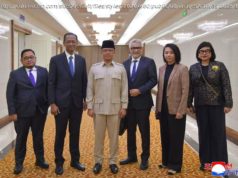Jeju, South Korea: How a tiny volcanic island has become home to hundreds of Yemeni refugees.
Jeju, a subtropical, volcanic island off of South Korea has an almost mythical status in Korean consciousness. The island is famed for its Hawaii-like topography and its Haenyeo —the famous “sea women.” The island is home to an ancient tradition where local women, sans diving apparatus, swim to the bottom of the sea and collect fish. Nearly ever Korean baby boomer honeymooned on Jeju. And even as Korean visits to the island declined in recent years as Chinese tourism to Jeju surged, the Seoul to Jeju route remains the world’s busiest flight.
And now, perhaps improbably, the idyllic island finds itself in the middle of the issue defining global politics in 2018: migration.
Jeju, as a tourism-centric, self-governing province, is unique among Korean provinces for how lax its border controls are. With very few, targeted exceptions—Afghanistan, Syria, and the like—anybody can visit the island for up 30 days without a visa. Crucially, that rule has traditionally applied to residents of Yemen, a country wracked since 2014 by a horrific civil war. And equally crucially, there is a direct flight from Kuala Lumpur, Malaysia, where many Yemeni refugees are camped out, and Jeju.
The result? More than 500 Yemenis have flown to Jeju from Malaysia this year and requested asylum—a 12-fold increase from the year before, when only 42 made the move. In 2015, meanwhile, even as the civil war in Yemen was already raging, a grand total of zero Yemenis requested asylum in Jeju, suggesting that informal social networks have conveyed to fleeing Yemenis that Jeju is a good place to go. Or at least that it had been.
South Korea is a signatory to the 1951 United Nations Refugee Convention. (Malaysia is not.) Nonetheless, the influx of Yemenis has led to a massive backlash in largely ethnically homogenous South Korea. More than 250,000 Koreans have signed a petition objecting to the Yemeni refugee claims. “Consider Korean Nationals First,” is the familiar-sounding rallying cry. And as of June 1, Jeju had added Yemen to the list of countries whose citizens cannot enter the island without a visa.
South Korean president Moon Jae-in has yet to weigh in response to the petition, though by law he must, as any petition gathering more than 200,000 signatures triggers a response from the president’s office. Moon’s reaction will be interesting: He is certainly a liberal by South Korean standards, friendly toward North Korea and supportive of a heavy government role in the economy. But Moon’s views on social issues would make western liberals blanche: He opposes gay soldiers, for example.
Korea and Japan, largely homogeneous societies, have managed to avoid the vexatious migration crises wracking Europe and North America. Japan, for its part, accepted 20 (yes, 20) out of 20,000 asylum applications in 2017. But the experience of tiny, picturesque Jeju suggests that Northeast Asia’s blissful insulation from the global refugee crisis may not last.






